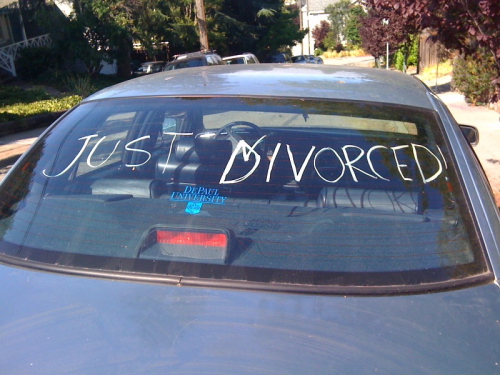Divorce statistics have surpassed the 50 percent mark some time ago, and while I’m not an evangelist for couples splitting up, I’m a huge advocate for facing reality.
Divorce happens—but the paradigm can shift. The stigma around it is unnecessary, and it only fuels the suffering. Many equate divorce with failure.
But which is worse: staying in a loveless marriage where both of you are miserable and you constantly fight and belittle each other in front of your children, or developing your inner awareness and communication skills which allow you to notice the completion of the relationship and skillfully move on?
When my former wife and I decided to get a divorce about eight years ago, the sentiment was nearly unanimous among my friends and acquaintances. “Ohhhhh, I’m so sorry to hear that” or “that’s so sad” were commonplace replies when they heard the news.
My response: “Really? Why do you say that?”
Of course, I know why. The vast preponderance of divorce cases in this country are far from amicable, and frequently downright ugly. Why would anyone expect mine to be any different?
Why? Because my former wife and I “chose” to have it be different. We chose to stay open in our communication with each other, and handle all issues lovingly.
Yes—lovingly.
Just because you aren’t “in love” with someone anymore, doesn’t mean you aren’t a loving person. When you think about it, who deserves your loving kindness more than someone you just spent a great part of your life with, perhaps even had children with?
So, I smiled at my friends and told them that divorce was a great decision that my partner and I had agreed upon. Were there going to be sad times ahead? No doubt. Were there going to be disagreements? Of course. But those are just surface issues.
Beneath it all, we were committed to being who we were at our core – loving human beings. We were committed to being in integrity, which meant not playing the “blame game” or becoming a victim of our circumstances. We were committed to modeling a loving relationship in transition, not only for our 4-year old son, but also for our community at large.
The message: Divorce doesn’t have to be nasty. It doesn’t have to create suffering. And it can actually be an opportunity for growth.
My relationship with my former wife, if you can grasp it, has actually grown to a deeper level over the years. We learned a great deal from each other while being married, and we continue to learn more over time.
This may be, in part, enhanced by the fact that we still have a son that we co-parent; however, I think our friendship would have endured even if that were not the case. There is no innate quality in human beings that require us to dislike someone that we once loved. I believe it is a choice.
Here are some of the “blind spots” you’ve got to watch out for:
Challenge: If you feel hurt, look at why you feel that hurt? At the deepest level, it is likely because someone doesn’t love you anymore (at least not in the way they once did). No matter how tough your ego may be, it can be painful to grapple with not being loved. Our meaning-making mind can draw all sorts of negative conclusions when this happens. Something must be wrong with me? What could I have done differently? Maybe I’m just not loveable at all.
This is often the toughest part of the divorce process for everyone—and it can even be worse if you are still in love with them.
Solution: Don’t let yourself get caught up in being the victim.
They are not wronging you because they don’t love you anymore. They just changed. Their love faded or died, and while that may sound harsh, you need to accept it. It actually has much more to do with them than with you (perhaps even everything). Fighting against it, questioning it, hoping for it to return will only prolong the suffering and take you out of conscious communication.
Instead, express it. Mindfully. Lovingly.
“I notice I’m wishing you still loved me” is much better than “you said you would always love me, you asshole!”
Directing anger (which is really just a mask of your sadness) at your partner will almost certainly lead to bitterness for both of you.
Challenge: Don’t build a wall around your heart. As much as you may feel like you need to retract your love and protect yourself from the pain, know that your heart is breaking open and this is a process of expansion.
“The deeper that sorrow carves into your being, the more joy you can contain.
Is not the cup that holds your wine the very cup that was burned in the potter’s oven? And is not the lute that soothes your spirit, the very wood that was hollowed with knives?” ~ Kahlil Gibran
Solution: Remain open and even vulnerable in any way that you can. Remember the Buddhist adage that pain is inevitable but suffering is optional, and you may even find that your suffering disappears. Don’t be afraid to spend some time crying with your partner.
Open your hearts together, express your fears and your sorrow, yet retain your ownership of who you are as a person. You are not defined by someone else or their love (or lack thereof) for you.
Challenge: Don’t slip down the slope of anger, resentment, and vindictiveness. It’s very easy to point your finger at your partner and blame them for everything that’s gone wrong. He should’ve done this, she could’ve done that, we would’ve been better off if—
Solution: Stop!
Get present. Be… Here… Now. This may be the ideal time for you to increase your meditation practice. Many of my clients are resistant to this at first. It’s much easier to believe that they are powerless to do anything without reciprocated support from their partner. Not true.
I’m not saying that you should try to take more than 100 percent responsibility for making things work. What I am saying is that you shouldn’t cop-out just because your partner isn’t showing up. Do your own work and let go of judging your partner at every step of the journey.
And a journey it is! Conscious divorce can be a complex and involved process that requires every bit as much nurturing as your relationship did. While it may not be easy, it can be one of the most worthwhile efforts you’ll make in your relationship evolution.
Learning to handle divorce in an integrated and conscious manner can also have a substantial impact on how you move into your next relationship.
My former wife and I are still great friends. How great? Well, I was at her recent wedding (they just had their one year anniversary) and she was at mine a little over six months ago.
Oh, yeah, and I married one of her best friends.
We still do big holiday dinners together and I’ve taken our son camping with just me, her new husband and his boys. I even interviewed her on my podcast, Consciously Speaking, just last week!
The rewards have been tremendous. Our son’s healthy respect for loving communication has been reinforced, and I believe we continue to set an example for how divorce can be.
The paradigm can shift, even if it’s just one divorce at a time.
Are you struggling through the process yourself? Do you know someone who is? Or even better yet, do you know of another example of a consciously divorced couple? I’d love to hear from you, so please share your comments below.
Love elephant and want to go steady?
Sign up for our (curated) daily and weekly newsletters!
Author: Michael Neeley
Editor: Renée Picard
Photo: Wikimedia Commons



Read 28 comments and reply